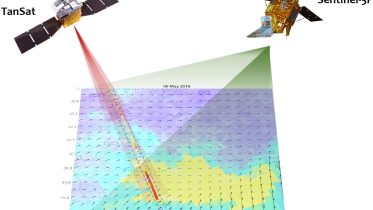
TanSat
TanSat, also known as CarbonSat, is a Chinese Earth observation satellite dedicated to monitoring carbon dioxide in Earth's atmosphere. It is generally classified as a minisatellite, and is the first dedicated carbon mission of the Chinese space program. The mission was formally proposed in 2010, and work began in January 2011. It is funded by the Ministry of Science and Technology and was built by the Shanghai Institute of Microsystem And Information Technology. TanSat carries two instruments: the Carbon Dioxide Spectrometer and the Cloud and Aerosol Polarimetry Imager. The Carbon Dioxide Spectrometer, also called CarbonSpec, is a high-resolution grating spectrometer which measures CO 2 absorption at 1.61 μm and 2.06 μm, and O 2 absorption in reflected sunlight at 0.76 μm. The Cloud and Aerosol Polarimetry Imager is a wide-field, moderate-resolution, imaging spectrometer which works in concert with CDS by compensating for measurement errors caused by clouds and aerosols.
